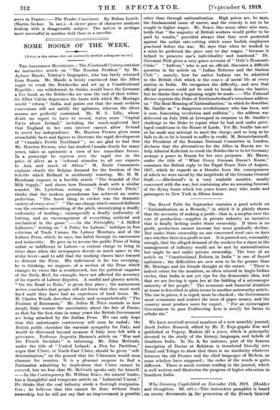The Round Table for September contains a good article ork
" Nationalization as a Reniedy," in which it is plainly shown that the necessity of making a 'profit—that is, a surphis over the cost of production—supplies in private industry an incentive that is fatally lacking under State ownership. If there is no profit, production cannot increase but must gradually decline. But under State ownership no one-Concerned need care or dOiii care whether there is a profit or not. It is pointed out; reasonably enough, that the alleged demand of the workers for a share in the management of industry would not be met by nationalilation but might be met under private ownership. The tone of an article on " Constitutional ReforM in India " is one of forced optimism ; the difficulties arc now seen to be far greater -than Mr. Montagu and his friends thOught at the outset. " There is indeed colour for the monition, so often uttered in AngloiIndian circles, that India is not yet ripe for the democratic idea, and that we are forcing it upon her at the bidding of a microscopic minority of her people." The economic and financial situation at home is described in plain terms in another noteworthy article. The rise in prices, it is urged, must be checked ; the Goiernment must economize and restrict the issue of paper money, and the country must produce more for export. " Por an extraYaiant Government to pass Profiteering Acts is Merely for Satan to rebuke sin."


































 Previous page
Previous page